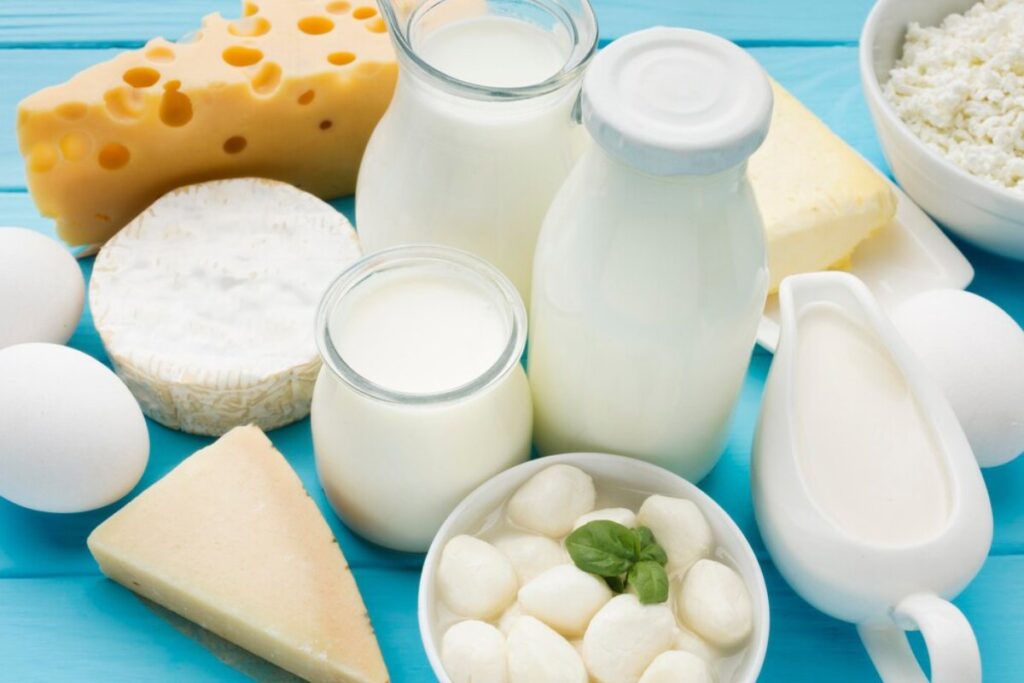The Health & Wellness Blog

The Truth About Dairy and Inflammation
Dairy has been divisive for decades. Others say it’s an inflammatory substance that should be avoided. Some feel that it is an essential part of a healthy diet. Others feel confused about the role of dairy in health and inflammation. There is so much conflicting advice Available.
In this post, we’ll explain the science behind it. We will consider both sides of the debate. Then we’ll provide you with practical takeaways to help you decide about dairy in your diet.
Why the Dairy Debate Matters
It’s the body’s natural response to injury, stress or infection. Chronic pain can lead to severe problems as well. And these are heart disease, arthritis, type 2 diabetes and autoimmune disorders.
Be sure to check out our other stories about diet. As a result, many are reconsidering foods like milk, cheese and yoghurt.
So, do dairy products promote or prevent inflammation? There is no black-and-white answer to that question.
Is Dairy Inflammatory or Anti-Inflammatory?
It Depends on the Individual
One reason dairy has such a polarising reputation is that it affects people differently.
- For people with lactose intolerance (who lack the enzyme lactase), consuming dairy can cause bloating, cramping, and discomfort. This isn’t inflammation in the immune system sense, but rather a digestive issue.
- For people with dairy allergies, even small amounts can trigger a strong immune response, which is indeed inflammatory.
- For the general population, current research suggests that most dairy, especially fermented forms like yoghurt and kefir, does not promote inflammation and may even help reduce it.
What the Science Says
Recent reviews of clinical studies show that dairy consumption is generally neutral or anti-inflammatory in healthy individuals. For example:
- A 2017 meta-analysis published in Critical Reviews in Food Science and Nutrition found that milk and dairy products had no pro-inflammatory effect in healthy subjects and might even reduce markers of inflammation.
- Fermented dairy, such as yoghurt and kefir, was associated with improvements in gut health and reduced systemic inflammation.

Key Benefits of Dairy When Tolerated Well
1. Rich Source of High-Quality Protein
Dairy provides all nine essential amino acids, making it a complete protein. This helps with muscle repair, immune function, and hormone production—especially important for children, athletes, and older adults.
2. Packed with Calcium and Vitamin D
Calcium supports bone health, while vitamin D helps regulate immune function and reduce inflammation. Many dairy products are fortified with vitamin D, making them an easy way to boost intake.
3. Contains Anti-Inflammatory Compounds
Some dairy products—especially fermented types—contain probiotics and bioactive peptides that support gut health, which plays a central role in controlling inflammation.
4. May Help With Weight Management
Contrary to outdated beliefs, full-fat dairy (when eaten in moderation) can actually promote satiety and reduce cravings, potentially supporting a healthy weight, another key factor in inflammation control.
Best Dairy Choices for Inflammation Control
Not all dairy is created equal. The type and quality of dairy matter.
Choose These:
- Plain Greek yoghurt – High in protein, low in sugar, contains probiotics
- Kefir – A fermented dairy drink rich in gut-friendly bacteria
- Aged cheeses (like Parmesan or Cheddar) – Easier to digest for some people
- Grass-fed milk or butter – Higher in omega-3s and CLA (conjugated linoleic acid), which may have anti-inflammatory effects

Limit or Avoid:
- Flavoured yoghurts – Often high in added sugar, which can promote inflammation
- Highly processed cheese products – Typically contain additives, fillers, and excess sodium
- Sweetened milk drinks and dairy-based desserts – These offer little nutritional value and may increase inflammation due to sugar content
Common Mistakes to Avoid with Dairy
Mistake 1: Not Listening to Your Body
If you notice symptoms like bloating, brain fog, or skin issues after eating dairy, don’t ignore them. Keeping a food and symptom journal can help identify whether dairy is a trigger for you.
Mistake 2: Overconsuming Dairy
Even healthy dairy should be consumed in balance. Overdoing it—especially with full-fat varieties—can lead to excessive saturated fat intake.
Mistake 3: Relying on Dairy for All Nutrients
Dairy can be part of a healthy diet, but it shouldn’t be the only source of key nutrients like calcium and protein. Rotate with other whole food sources like leafy greens, legumes, nuts, and seeds.
Expert Tips for Including Dairy in an Anti-Inflammatory Diet
Tip 1: Go for Fermented First
Fermented dairy, like kefir, yoghurt, and some aged cheeses, can help populate your gut with beneficial bacteria. A healthy gut microbiome is closely tied to lower inflammation levels.
Tip 2: Read the Label
Look for products with minimal ingredients and no added sugar. “Cultured milk,” “live active cultures,” and “no artificial additives” are good signs.
Tip 3: Explore Dairy Alternatives if Needed
If you’re lactose intolerant or prefer to avoid dairy for personal reasons, plant-based alternatives like almond, oat, or coconut milk can work—just choose unsweetened versions with added calcium and vitamin D.
Advanced Insights and Recommendations
Understanding A1 vs. A2 Casein Proteins
Some emerging research suggests that A1 casein, a type of protein found in most conventional cow’s milk, may be harder to digest and slightly more inflammatory than A2 casein, which is found in goat’s milk and some speciality cow breeds.
Trying A2 milk products or goat’s milk may be a good option for those who experience mild digestive discomfort from regular dairy but don’t have a full-blown allergy.
The Gut-Immune-Inflammation Link
Dairy’s impact on inflammation may depend less on the product itself and more on the state of your gut. If your gut barrier is compromised (a condition known as “leaky gut”), even normally well-tolerated foods can cause issues. This is where fermented dairy really shines—it helps support gut integrity and microbiome diversity.
Quote from a Registered Dietitian: “If a client tolerates dairy, I always recommend fermented forms. They’re a great way to support both gut and immune health, which are foundational for inflammation control.” – Julie Park, RDN
The Final Word: Finding Your Balance with Dairy
The reality about dairy and inflammation is more complicated than most headlines indicate. For many, dairy is not inflammatory. It provides important nutrients and health benefits. Mindful eating and less processed forms make a difference.
But it’s also true that dairy doesn’t work for everyone. A body’s response can be more important than a general rule. If you do well with it, indulge in quality, low-sugar options. If you do have symptoms, discuss alternatives, talk to your health care provider or dietitian.
The best anti-inflammatory diet for you is the one that aligns with your health, lifestyle and preferences.
Want a specific anti-inflammatory meal plan, with or without dairy? Let’s create a solution that works for you and your well-being.









